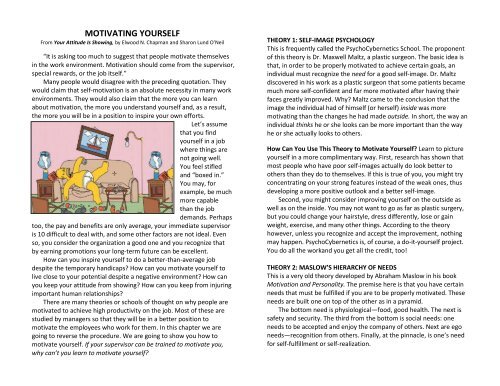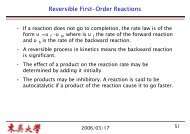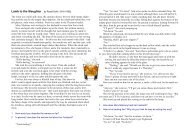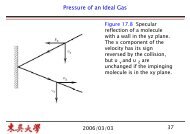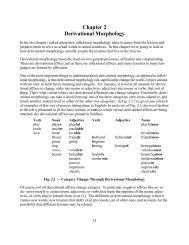Print and read this article about self motivation
Print and read this article about self motivation
Print and read this article about self motivation
Create successful ePaper yourself
Turn your PDF publications into a flip-book with our unique Google optimized e-Paper software.
MOTIVATING YOURSELF<br />
From Your Attitude Is Showing, by Elwood N. Chapman <strong>and</strong> Sharon Lund O’Neil<br />
“It is asking too much to suggest that people motivate themselves<br />
in the work environment. Motivation should come from the supervisor,<br />
special rewards, or the job it<strong>self</strong>.”<br />
Many people would disagree with the preceding quotation. They<br />
would claim that <strong>self</strong>-<strong>motivation</strong> is an absolute necessity in many work<br />
environments. They would also claim that the more you can learn<br />
<strong>about</strong> <strong>motivation</strong>, the more you underst<strong>and</strong> your<strong>self</strong> <strong>and</strong>, as a result,<br />
the more you will be in a position to inspire your own efforts.<br />
Let’s assume<br />
that you find<br />
your<strong>self</strong> in a job<br />
where things are<br />
not going well.<br />
You feel stifled<br />
<strong>and</strong> “boxed in.”<br />
You may, for<br />
example, be much<br />
more capable<br />
than the job<br />
dem<strong>and</strong>s. Perhaps<br />
too, the pay <strong>and</strong> benefits are only average, your immediate supervisor<br />
is 10 difficult to deal with, <strong>and</strong> some other factors are not ideal. Even<br />
so, you consider the organization a good one <strong>and</strong> you recognize that<br />
by earning promotions your long-term future can be excellent.<br />
How can you inspire your<strong>self</strong> to do a better-than-average job<br />
despite the temporary h<strong>and</strong>icaps How can you motivate your<strong>self</strong> to<br />
live close to your potential despite a negative environment How can<br />
you keep your attitude from showing How can you keep from injuring<br />
important human relationships<br />
There are many theories or schools of thought on why people are<br />
motivated to achieve high productivity on the job. Most of these are<br />
studied by managers so that they will be in a better position to<br />
motivate the employees who work for them. In <strong>this</strong> chapter we are<br />
going to reverse the procedure. We are going to show you how to<br />
motivate your<strong>self</strong>. If your supervisor can be trained to motivate you,<br />
why can’t you learn to motivate your<strong>self</strong><br />
THEORY 1: SELF-IMAGE PSYCHOLOGY<br />
This is frequently called the PsychoCybernetics School. The proponent<br />
of <strong>this</strong> theory is Dr. Maxwell Maltz, a plastic surgeon. The basic idea is<br />
that, in order to be properly motivated to achieve certain goals, an<br />
individual must recognize the need for a good <strong>self</strong>-image. Dr. Maltz<br />
discovered in his work as a plastic surgeon that some patients became<br />
much more <strong>self</strong>-confident <strong>and</strong> far more motivated after having their<br />
faces greatly improved. Why Maltz came to the conclusion that the<br />
image the individual had of him<strong>self</strong> (or her<strong>self</strong>) inside was more<br />
motivating than the changes he had made outside. In short, the way an<br />
individual thinks he or she looks can be more important than the way<br />
he or she actually looks to others.<br />
How Can You Use This Theory to Motivate Your<strong>self</strong> Learn to picture<br />
your<strong>self</strong> in a more complimentary way. First, research has shown that<br />
most people who have poor <strong>self</strong>-images actually do look better to<br />
others than they do to themselves. If <strong>this</strong> is true of you, you might try<br />
concentrating on your strong features instead of the weak ones, thus<br />
developing a more positive outlook <strong>and</strong> a better <strong>self</strong>-image.<br />
Second, you might consider improving your<strong>self</strong> on the outside as<br />
well as on the inside. You may not want to go as far as plastic surgery,<br />
but you could change your hairstyle, dress differently, lose or gain<br />
weight, exercise, <strong>and</strong> many other things. According to the theory<br />
however, unless you recognize <strong>and</strong> accept the improvement, nothing<br />
may happen. PsychoCybernetics is, of course, a do-it-your<strong>self</strong> project.<br />
You do all the work<strong>and</strong> you get all the credit, too!<br />
THEORY 2: MASLOW’S HIERARCHY OF NEEDS<br />
This is a very old theory developed by Abraham Maslow in his book<br />
Motivation <strong>and</strong> Personality. The premise here is that you have certain<br />
needs that must be fulfilled if you are to be properly motivated. These<br />
needs are built one on top of the other as in a pyramid.<br />
The bottom need is physiological—food, good health. The next is<br />
safety <strong>and</strong> security. The third from the bottom is social needs: one<br />
needs to be accepted <strong>and</strong> enjoy the company of others. Next are ego<br />
needs—recognition from others. Finally, at the pinnacle, is one’s need<br />
for <strong>self</strong>-fulfillment or <strong>self</strong>-realization.
The crux of <strong>this</strong> theory is that the bottom needs must be fulfilled<br />
before the others come into play. In other words, you must satisfy your<br />
need for food <strong>and</strong> security before social needs become motivating. You<br />
must satisfy social <strong>and</strong> ego needs before <strong>self</strong>fulfillment is possible.<br />
How Can You Use This Idea to Motivate Your<strong>self</strong> to Reach Goals<br />
If you believe Maslow is right, it would be <strong>self</strong>-defeating to<br />
reverse the pyramid or “skip over” unsatisfied needs to reach<br />
others. Chances are good, however, that your first two<br />
needs are being adequately satisfied so you could make a<br />
greater effort to meet new people <strong>and</strong> make new friends.<br />
This could, in turn, help to satisfy your ego needs. With<br />
both your social <strong>and</strong> ego needs better satisfied you might<br />
be inspired to attempt greater creative efforts which<br />
could eventually lead you to greater <strong>self</strong>-realization.<br />
THEORY 3: PSYCHOLOGICAL ADVANTAGE<br />
This school was founded by Saul W. Gellerman. It contends that people<br />
constantly seek to serve their own <strong>self</strong>-interests, which change as they<br />
grow older. People can make their jobs work for them to give them a<br />
psychological advantage over other people at the same level. The way<br />
to create a psychological advantage in a starting job that is beneath<br />
your capacity is to learn all there is <strong>about</strong> that job. That way, you can<br />
use the job as a springboard to something better, a position that will<br />
give you more freedom <strong>and</strong> responsibility.<br />
How Could You Use This to Inspire Your<strong>self</strong> The best way,<br />
perhaps, is to be a little <strong>self</strong>ish <strong>about</strong> your job. Work for the<br />
organization <strong>and</strong> your<strong>self</strong> at the same time. Instead of letting your job<br />
control you, perhaps pulling you <strong>and</strong> your attitude down, use it as a<br />
launching pad. Use it to build human relations that will be important<br />
later on. Study the structure of your organization so you will<br />
underst<strong>and</strong> the lines of progression better than the other employees.<br />
Study the leadership style of your supervisor <strong>and</strong> others so that you<br />
will have a better one when your turn comes.<br />
THEORY 4: MOTIVATION-HYGIENIC SCHOOL<br />
This theory was developed by Professor Frederick Herzberg. Basically it<br />
claims that undesirable environmental factors (physical working<br />
conditions) can be dissatisfiers. Factors of achievement, recognition,<br />
<strong>and</strong> freedom, on the other h<strong>and</strong>, are satisfiers. All working<br />
environments have both negative <strong>and</strong> positive factors.<br />
How Can You Take Advantage of This Theory People who<br />
maintain positive attitudes under difficult circumstances do so through<br />
attitude control. They concentrate only on the positive factors in their<br />
environment. You can, for instance, refuse to recognize the<br />
demotivating factors in your job <strong>and</strong> concentrate only on those<br />
things that will satisfy your needs better.<br />
This could mean a de-emphasis on physical factors <strong>and</strong><br />
more emphasis on psychological factors such as social, ego,<br />
<strong>and</strong> <strong>self</strong>-fulfillment needs. One individual puts it <strong>this</strong> way: “I<br />
work in a very old building with poor facilities. Even so I have<br />
learned that I can be happy there because of the work I do<br />
<strong>and</strong> the great people I work with. One quickly gets used to<br />
fancy buildings <strong>and</strong> facilities <strong>and</strong> begins to take them for<br />
granted anyway.”<br />
THEORY 5: THE MAINTENANCE-MOTIVATION THEORY<br />
This school is much like Herzberg’s hygienic approach <strong>and</strong> was<br />
developed by M. Scott Myers of Texas Instruments, Inc. His research<br />
found that employees usually fall into one of two groups: <strong>motivation</strong>seekers<br />
<strong>and</strong> maintenance-seekers. In short, some people look for those<br />
factors that are motivating to them <strong>and</strong> are constantly pushing<br />
themselves toward fulfillment. Others are concerned with just staying<br />
where they are. Maintenance-seekers spend much time talking <strong>about</strong><br />
working conditions, wages, recreational programs, grievances, <strong>and</strong><br />
similar matters <strong>and</strong> do little or nothing to motivate themselves.<br />
Motivationseekers, on the other h<strong>and</strong>, look beyond such matters.<br />
How Might You Use This to Improve Your Own Motivation<br />
The obvious answer is, of course, to keep your<strong>self</strong> out of the<br />
maintenance-seeker classification. To do <strong>this</strong> you should try not to<br />
overassociate with those in the maintenance classification. Without<br />
your knowing it, they could pull you into their camp. Try also to talk<br />
<strong>about</strong> positive things instead of being a complainer. Verbalizing<br />
negative factors often intensifies the dissatisfaction one feels. Turn<br />
your attention to things you can achieve on the job-not to the negative<br />
factors.<br />
(1,338 words)


